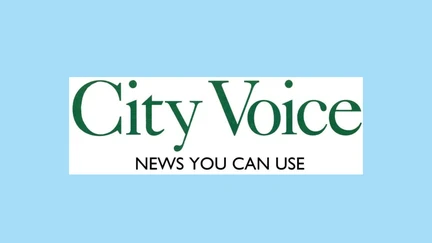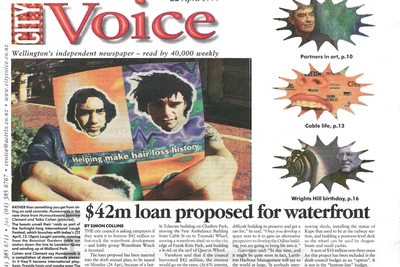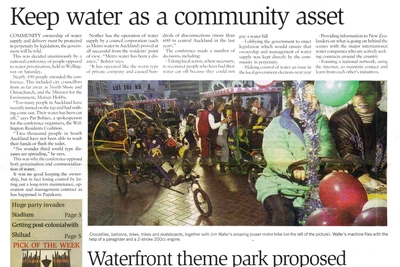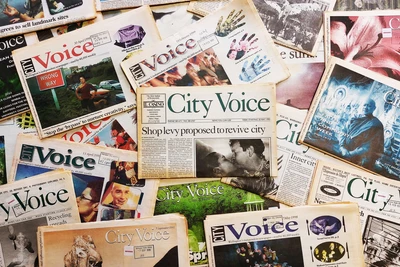City Voice: News you can use
One of Wellington’s most significant independent media outlets of the 1990s has been fully digitised and is now available to view on Wellington City Recollect.

For just over eight years City Voice dominated Wellington’s alternative media scene. More than twenty years after its last issue was printed, the library’s archived collection of the weekly newspaper has been fully digitised and is available to view and search on our heritage platform Wellington City Recollect.
City Voice was founded by its editor Simon Collins and the journalist Jeremy Rose. They were soon joined by journalists Nick Bollinger, Mark Cubey & Rachel Woodley, the photographer David Gurr, the artist Chris Healey as well as a core of advertising, administration and distribution staff. The newspaper soon became the regular outlet for dozens of reviewers, columnists and journalism students and began the concept of a ‘paper within a paper’ where several pages would be regularly handed over to local communities who until then had few opportunities to have their voices heard.
Beginning at a time when access to the internet was still largely confined to universities and government institutions, City Voice distilled the talents of many local writers in a single publication before such output became diluted across a multitude of different online forums and websites. It also provided a mouthpiece for a new generation of activists before the introduction of social media as well as holding the city council and local body politicians to account. Operating out of offices in Cuba Mall, it was owned by the Te Aro Publishing Cooperative Ltd with shares being held by around 160 people who had invested a total of $165,000 as core capital but the newspaper principally operated on its advertising revenue in an era before the widespread growth of the online advertising absorbed much of this income stream.

‘Humourbeasts’ Jermain Clement and Taika Waititi (aka Taika Cohen) appear on the cover of a 1999 issue.
Every Thursday a new edition would hit the streets with 21,000 copies being delivered free to every letterbox in the CBD & the inner-suburbs and another 7000 copies available to be picked up in cafes or from newsstands scattered throughout the city. It soon became the go-to place to find out what was happening in the arts and theatre scene with extensive listings and reviews published every week.
However, it was with its news coverage that City Voice had its biggest impact. It avoided the crime, violence and scandal stories that often dominated main-stream media and instead covered local stories where it felt that the public could make a difference with issues such as the planned development of the waterfront or the inner-city motorway bypass. Controversial neo-liberal reforms which had become common within central-government in the early 1990s were starting to have an impact at a local level with various proposals to introduce user charges for social & community services and the paper helped galvanise opposition to many of these. City Voice became a democratic alternative to commercial media where the perceived need to ‘sell’ news was turning people (particularly youth) away from consuming it.
The newspaper became a ‘hot-house’ for young journalism students, many of whom went on to have notable careers in the media and communications industries. Volunteers gained experience in the field, assisting staff writers to research and write stories as well as helping out with page layouts and sub-editing. Regular columns provided an alternative take on main-stream staples such as car, fashion and restaurant reviews, the emphasis being on what most Wellingtonians actually consumed rather than expensive aspirational products and services which were often well beyond what many people could afford. Graphic design was also an important part of the newspaper and improvements in computer & printing technology over its eight-year run can be seen in the manner in which its ‘look’ developed. Advertising ‘reps’ worked hard to constantly sell space in the paper to bring in the revenue required to pay staff and to keep the presses rolling. However, roles were not siloed and someone employed to sell advertising was welcome to try their hand at writing reviews while a journalist who had written an investigative article was just as likely to be helping with page layouts as print deadlines approached.

Illustrating how some issues never change, this cover from 2000 details the concern of the city potentially losing ownership of its water assets.
However, despite its editorial success and impact, advertising revenue never fully met its costs, eventually resulting in capital reserves being drained. Investigative articles became too narrowly focussed on a small range of subjects and the arrival of the internet also started to have an impact following the launch of several local ISPs which drew readers away from print media as they discovered new online sources of news and information. In late 2000 the board of directors, aware of the personal liability they would be subject to if accused of ‘reckless trading’, decided to wind up the cooperative. After a brief hiatus, a new company was formed called City Voice Media Ltd which raised new capital and continued to publish the newspaper with a new look. However, it soon became apparent that the newspaper was no longer financially sustainable and its final issue was printed on 5th July 2001.
